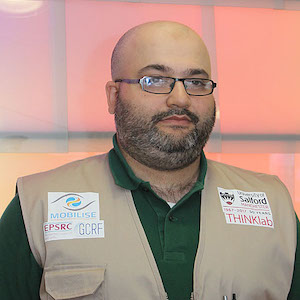Hisham Tariq

Researcher
h.tariq4@salford.ac.uk
Biography
Hisham Tariq joined the University of Salford in 2016 and has worked as a Social Scientist on research projects focusing on disaster risk reduction, urban planning, critical infrastructure, and community resilience. Hisham has worked in disaster management research in the UK, Pakistan, Liberia, Afghanistan, Sri Lanka, and Malaysia and has developed close collaborative relationships with organisations and researchers. He is currently involved with the MOBILISE and TRANSCEND projects.
Before joining the THINKlab, Hisham was a Research Associate at the Social Research Unit, International Islamic University of Islamabad, Pakistan. Here he worked with several International Agencies (USAID, DFID/FCO UK), International Non-Governmental Organizations (Islamic Relief, Qatar Charity, Merlin) and Academic Institutions (the University of Bath and the University of Birmingham in the UK, and CASE Western, and Kennedy School of Government, Harvard). At the SRU, he was a lead social scientist in charge of developing and implementing research design, liaising with national and international stakeholders, and supervising fieldwork and data collection process and analysis.
These research projects mostly involved looking at issues related to disaster management, public health, water and sanitation, extremism, conflict resolution, religiosity, education, and natural resource management at the community levels. As part of multi-disciplinary research teams working on diverse subjects. Some of these have included interviews, focus groups, questionnaires, causal loop diagramming and participatory modelling/group model building sessions, and several Participatory Rural Appraisal methods such as transect walks, social, resource and mobility mapping. Additionally, Hisham has worked on and run tabletop exercises, board games, group activities, and serious games in public health and disaster risk reduction settings.
Research Interests
- Disaster Management/Resilience
- Systems Thinking
- System Dynamics
- Participatory Modelling
- Serious Games
Research Projects (Current and Previous)
- TRANSCEND, GCRF funded
- MOBILISE, GCRF funded
- EDURISC, UoS funded
- EUCIRCLE, EU funded
- Ebola Economic Impact Study, Chatham House
- Using Religious Buildings for Health Risk Communication, PHE
- Religiosity and Education Attainment, North-Eastern University, USA
- Faith and Development, DFID funded
- Hajj Outcomes project, University of Harvard, USA
Qualifications and Memberships
- PhD Disaster Management (o)
- MPhil Disaster Resilience
- MSc Economics
- PGD Disaster Management
- PGD Social Research Methods and Statistics
- BSc. (Hons) Economics
- BA Sociology
- Member, International System Dynamics Society
- Member, Policy Council Member, UK System Dynamics Society
- Member, Participatory Modelling Group
Publications, Conference Papers, and Presentations
Tariq, H., Pathirage, C. P., & Fernando, T. (2021). Measuring Community Disaster Resilience at local levels: An adaptable Resilience Framework. International Journal of Disaster Risk Reduction, 102358. doi:https://doi.org/10.1016/j.ijdrr.2021.102358
Tariq, H., Pathirage, C., & Fernando, T. (2021). Measuring community disaster resilience using Q-methods: a physical resilience perspective. Built Environment Project and Asset Management, 11(4), 722-737. doi: https://doi.org/10.1108/BEPAM-03-2020-0053
Tariq, H., Emes, D. T., Boo, Y. Y., Light, A., Sadique, Z., Khan, M., et al. (2020). Economic impact of Ebola virus disease outbreak on an extractive firm: a case study. UCL Open Environment(1), 1-18. doi: https://doi.org/10.14324/111.444/ucloe.000007
Tariq, H. (2019). Mapping Community Disaster Resilience: Modelling and Understanding diverse stakeholder groups. Presented at the 37th International Conference of The System Dynamics Society. Albuquerque, NM, USA.
Tariq, H. (2018). Becoming a Better (Digital) Humanitarian: Introduction to Open Platforms for Disaster Response. Presented at Session on Community Engagement Platforms: Enhancing Disaster Risk Reduction and Resilience Workshop. Mount Lavinia, Sri Lanka.
Tariq, H., Pathirage, C., Shakou, L. M., Sfetsos, A., & Petrovic, N. (2018). Modelling Critical Infrastructure Resilience in EU-CIRCLE. Presentation and Conducted Resilience Workshop at the Infrastructure Resilience Conference 2018. Zurich, Switzerland.
Dar, O., F. Viliani, H. Tariq, E. Buckley, A. Omaar, and, E. O., & Heymann, D. L. (2018). Ebola and emerging infections: Managing risks to the mining industry. In S. H. Ali, K. Sturman, & N. Collins (Eds.), Africa’s Mineral Fortune: The Science and Politics of Mining and Sustainable Development: Taylor & Francis.
Sfetsos, A., Katopodis, T., Eleftheriadou, A., Eftychidis, G., Gkotsis, I., Leventakis, G., Hedel, R., Hamman, S., Shakou, L. M., Tariq, H., Mikellidou, C. V., & Pathirage, C. 2017. How interconnected critical infrastructures can support societal resilience under future climate: The EU-CIRCLE approach.
RESILIENCE, 161. The 2nd International Workshop on Modelling of Physical, Economic and Social Systems for Resilience Assessment. Ispra, Italy.
Tariq, H., & Pathirage, C. P. (2017). D4.3 EU-CIRCLE RESILIENCE FRAMEWORK. EU-CIRCLE Research Consortium Repository. Luxemburg, EU.
Tariq, H. (2017). A Systems Analysis of Preventative Measures and Attributes of a Resilient Enterprise. (MPhil), University of Salford, Manchester.
Viliani, F., Edelstein, M., Omaar, A., Dar, O., Buckley, E., Tariq, H., & Sadique, Z. (2016). A collaborative approach to infectious disease preparedness: the IDRAM initiative. Paper presented at the SPE International Conference and Exhibition on Health, Safety, Security, Environment, and Social Responsibility.